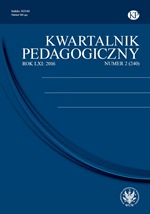Polskie koncepcje i programy wychowania przez przygodę. Wybrane przykłady z pierwszej połowy XX wieku
Polish concepts and programmes of adventure education. Selected examples from the first half of the 20th century
Author(s): Wacław Sonelski, Artur MagieraSubject(s): Social Sciences, Education
Published by: Wydawnictwa Uniwersytetu Warszawskiego
Keywords: adventure education; educational programme
Summary/Abstract: The purpose of this paper is to trace the very origins of an adventure education in Poland. We present some ideas that can be found in the Polish literature and articles published in the early 1920s. In the novel entitled Lato leśnych ludzi (The Forest People’s Summer) Maria Rodziewiczówna (1864–1944) presents a complete adventure education programme which is realized in a forest wilderness. Although this programme is similar in properties to that of British boy scouts, both educational systems are different in many ways, so “the forest people school” can be regarded as Rodziewiczówna’s original concept based mainly on the Polish history and local traditions. Ślizgawka (Ice Rink) is a memoir written by Franciszek Wysłouch (1896–1978) describing a unique pattern of winter skate-tour performed in the Polesie country before the Great War. These skate expeditions in the wilderness are the best examples of the pure adventure education. General Mariusz Zaruski (1867–1941) in his articles edited in the anthology Na bezdrożach tatrzańskich (In the Tatra Wilderness) pointed out many educational advantages of mountaineering and ski-touring in the Tatra Mountains. He also focused his attention on the wilderness education programmes. These ideas sounded revolutionary and were rejected by the Polish society of the beginning of 20th century.
Journal: Kwartalnik Pedagogiczny
- Issue Year: 240/2016
- Issue No: 2
- Page Range: 185-202
- Page Count: 8
- Language: Polish
- Content File-PDF

